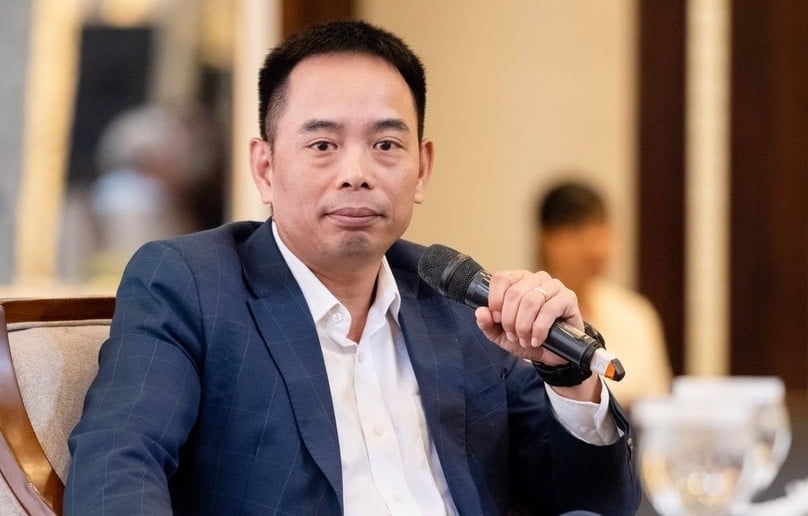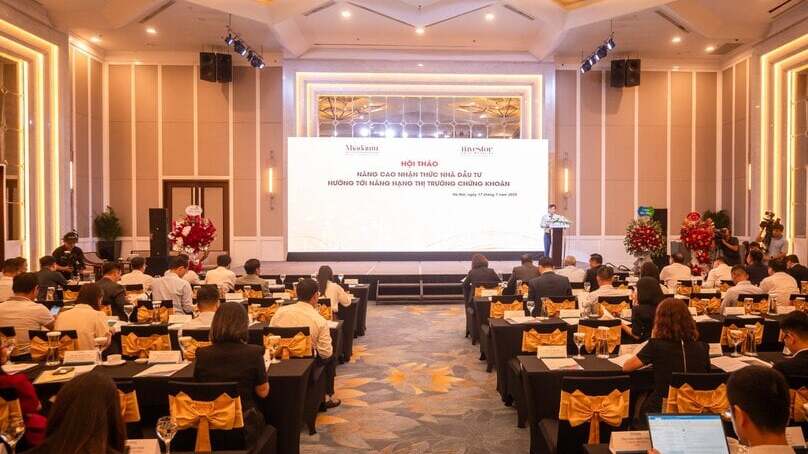Vietnam's fund management market must be transparent, sustainable to allure investors: experts
To spur the growth of Vietnam’s fund management industry, an open, transparent and fair playing field is needed for all participants, experts said at a seminar hosted by The Investor on Thursday.
The seminar in Hanoi, themed “Raising investor awareness towards stock market status upgrade”, was in line with the country's effort to get its stock market status lifted from "frontier" to "emerging".
Opening doors to international investment funds
Looking back at the development of Vietnam’s stock market in particular and its broader financial market, there has been progress, yet it still falls short of expectations, said Do Ngoc Quynh, secretary general of the Vietnam Bond Market Association.
"Government bonds began listing in 2009. While the capital market has grown overall, the fund management industry appears to have lagged behind, and the financial system remains heavily bank-dependent," he told the seminar.
The country’s fund management industry is still in its infancy, with assets under management accounting for just around 6% of GDP, or roughly $26 billion.
Given this, he stressed the need to foster an open, transparent and fair playing field. This allows capable players to compete fairly with the less capable to be eliminated, thereby improving the overall quality of the industry.

Do Ngoc Quynh, secretary general of the Vietnam Bond Market Association. Photo by The Investor.
“The foundation of the fund management market lies in licensed fund management companies that offer high-quality investment products. Investors ultimately seek profits, so the more effective and profitable a product is, the more attractive it becomes. It’s important to emphasize that profits and performance go hand-in-hand with risk appetite,” he noted.
The expert pointed out that one major hurdle for Vietnam’s financial market is the limited financial literacy among retail investors.
“Most Vietnamese investors haven’t been trained in personal investment,” he explained. “Driven by greed, they tend to chase high-return channels without fully understanding the risks.”
He also emphasized investor confidence as another important factor in building a sustainable financial market. This comes from transparency, fairness and strictness in the legal system, and professionalism in the implementation by regulators and market participants.
“Once investors lose trust, it’s hard to win them back,” Quynh said.
He noted that Vietnam currently has more than 40 fund management companies, but only a handful actually offer fund products, and even those firms provide limited product options for investors.
“Interest from international investors is rising. But licensing hurdles are high, leaving acquisitions as their main entry route,” Quynh highlighted.
Therefore, he suggested opening the door to them with a focus on creating effective products, improving transparency, and enhancing investor trust.
Sharing Quynh’s views, Nguyen Hang Nga, general director of Vietcombank Fund Management Company Limited (VCBF), a joint venture between state-controlled Vietcombank and Franklin Templeton Investments (FTI), said only quality products can earn investor trust.

Nguyen Hang Nga, general director of Vietcombank Fund Management Company Limited. Photo by The Investor.
At VCBF, its first fund was launched in August 2014, and the fund's performance has "multiplied" since then.
Nga shared that when compared with VN30, which tracks the 30 largest caps on the Ho Chi Minh Stock Exchange (HoSE), the fund has delivered significantly higher returns, and long-term investors have reaped strong gains.
According to the VCBF executive, investors always seek the highest possible returns, but those often come with higher risks.
“Improving investor awareness is critical - we need to promote long-term thinking, not just over one year, but over five to 10 years,” Nga said. “When comparing self-directed investing with investing through a fund, the evaluation should be based on long-term performance. Investors should ask themselves whether they’ve truly outperformed the fund over that period.”
Fund managers have the time, experience, and expertise - and they’re likely to deliver better results, she further explained.
Allowing banks to directly distribute fund certificates
For the industry to truly play its role, synchronous and breakthrough solutions are needed, Nga said.
"Investment funds need to be recognized as an important capital channel for the economy, helping to reduce capital pressure on the banking system. It is also necessary to allow banks to provide asset management services and officially distribute fund certificates," she told the seminar.
There needs to be solutions to increase the quantity and quality of goods in the capital market, a prerequisite for funds to have attractive profits, creating long-term confidence for investors, she added.
Another solution is increasing investor confidence - from transparency to practical efficiency. “Last but not least is the tax incentive policy to encourage investors to invest long-term.”
According to Nguyen Cong Minh, head of the department for supervision of fund management companies and securities investment funds under the State Securities Commission (SSC), Vietnam’s fund management industry has developed only over the past decade.
When building the legal framework for the sector, the guiding principle was alignment with international practices - from the multi-tiered supervisory model to product design and portfolio limits, he said.
Minh stressed that at that time, the SSC – the country’s stock market watchdog - adopted a cautious approach to ensure compliance with global standards.

The Investor and its Vietnamese-language sister Nhadautu.vn hold a seminar titled “Raising investor awareness towards stock market status upgrade” in Hanoi on July 17, 2025. Photo by The Investor.
The fund management industry now comprises 125 funds, with total assets under management of around VND765 trillion ($29.24 billion) and a net asset value (NAV) of about VND94 trillion ($3.59 billion).
Exchange traded funds (ETFs) and open-ended funds account for over 80% of the industry’s total assets - flexible investment vehicles known for their safety and transparency.
“We’re in the final stages of drafting a proposal to restructure the investor base, which will soon be submitted to the Ministry of Finance,” Minh said. “The plan includes several key elements, such as establishing a legal framework to ease portfolio and investment limit constraints for funds. It also calls for the design of new fund types and investment indices.”
He added that the proposal also aims to strengthen the capacity of fund management firms. “There are currently 43 licensed fund managers, but only a small number are actively investing and running efficient portfolios,” he noted.
Regarding the diversification of distribution channels, Minh emphasized that the proposal to allow banks to directly distribute fund certificates is not new. The SSC will study the matter and make recommendations to the central bank.
The proposal also takes tax matters into account. “We’ve held discussions with fund management companies regarding tax policies for the industry, including those for fund managers and investors.”
“At the same time, we’re balancing these considerations with the need to mobilize resources for the state budget. Further research and appropriate recommendations will follow.”
Minh noted that a key component of the proposal is improving investor awareness. Since the inception of the stock market, the SSC has operated a securities training center and issued professional licenses. However, he said, investor education shouldn’t be the sole responsibility of regulators - it requires coordinated efforts from regulatory bodies, market operators, and market participants alike.
“Over the past decade, the fund management industry has delivered fairly stable returns, averaging around 13%,” Minh said. “That said, its growth is closely tied to the broader economy and the stock market. Looking ahead, there will be plenty of opportunities for the sector to expand.”
The Vietnamese financial market is entering a pivotal stage with expectations of status upgrade (from "frontier" to "emerging"), institutional reform, and comprehensive digitalization.
In a resolution passed on June 27, 2025, the National Assembly, Vietnam's legislature, requested the development of capital market mobilization channels. Specifically, all preparations must be completed in 2025 to get the market status upgraded.
Upgrading the market status is a key priority assigned by the Government to the Ministry of Finance. Under the ministry’s direction, the State Securities Commission (SSC) and relevant agencies have actively worked to improve the legal framework, upgrade technological infrastructure, and improve market operation conditions to meet the stringent standards set by international rating organizations.
Alongside efforts to upgrade the market status, improving investor awareness is a critical focus of regulators to foster the sustainable development of Vietnam’s stock market.
Under the Prime Minister’s Decision No. 1726/QĐ-TTg dated December 29, 2023, which approved the Stock Market Development Strategy until 2030, the Government requests diversifying the investor base and improving the quality of investment demand to ensure sustainability.
This includes enhancing the capabilities of individual investors through training and financial education. A comprehensive investor training strategy is to be developed, identifying objectives, target groups, and phased implementation according to market development stages.
- Read More
Vingroup reports strong performance in 9 months
Vietnam’s leading private conglomerate Vingroup (HoSE: VIC) recorded consolidated net revenue of VND169.61 trillion ($6.45 billion) in the first nine months of 2025, up 34% year-on-year, reflecting strong momentum across its core business segments.
Companies - Sat, November 1, 2025 | 12:04 pm GMT+7
Vietnam’s tech unicorn VNG books 30% profit surge in Q3 on strong gaming business
Vietnamese tech unicorn VNG Corp (UPCoM: VNZ) posted a 30% year-on-year increase in operating profit to VND263 billion ($10 million) in Q3, supported by cost controls and strong performance in its gaming and payment businesses.
Companies - Sat, November 1, 2025 | 10:02 am GMT+7
Vietnam's e-commerce sales soars 34% in Jan-Sept on stronger demand
Sales on four e-commerce platforms in Vietnam - Shopee, TikTok Shop, Lazada, and Tiki - hit VND305.9 trillion ($11.62 billion) in the first nine months of 2025, up 34.4% year-on-year, according to new data from analytics firm Metric.
Economy - Sat, November 1, 2025 | 9:35 am GMT+7
Vietnam's famous actress Truong Ngoc Anh detained for 'property appropriation'
Truong Ngoc Anh, former chairwoman of Dat Rong Real Estate JSC and one of the most famous actresses in Vietnam, has been accused of abusing trust to appropriate thousands of taels of gold and tens of billions of dong (VND10 billion = $380,000).
Society - Fri, October 31, 2025 | 10:53 pm GMT+7
Vietnam's dairy giant Vinamilk reaps $95 mln in Q3 post-tax profit
Vinamilk recorded consolidated post-tax profit of VND2.51 trillion ($95.42 million) in Q3, up 4.5% year-on-year, according to a company release.
Companies - Fri, October 31, 2025 | 10:17 pm GMT+7
EVNNPT, northern Vietnam province Son La to speed up power transmission projects
Son La province will coordinate closely with National Power Transmission Corporation (EVNNPT) to accelerate construction of key power transmission projects aimed at supporting regional and local socio-economic development.
Companies - Fri, October 31, 2025 | 9:40 pm GMT+7
Carlsberg Vietnam donates $57,000 to support central cities Hue, Danang after historic floods
As central Vietnam endures one of the most devastating floods in recent decades, Carlsberg Vietnam has swiftly contributed VND1.5 billion ($57,000) to support relief and recovery efforts in Hue and Danang, two localities hardest hit by the historic rainfall and landslides.
Companies - Fri, October 31, 2025 | 9:37 pm GMT+7
HDBank makes $563 mln pre-tax profit in 9 months
HDBank (HoSE: HDB) recorded consolidated profit before tax of VND14.8 trillion ($562.53 million) for the first nine months of the year, up 17% increase year-on-year.
Companies - Fri, October 31, 2025 | 8:27 pm GMT+7
Vietnam needs more clean energy, highly-skilled labor to capture semiconductor investment wave: exec
Vietnam is well prepared in terms of infrastructure, but to capture the semiconductor investment wave, it must address the challenges of clean energy and highly-skilled labor, said Tran Tan Sy, deputy CEO of KN Holdings, a leading multi-sector group in Vietnam.
Industries - Fri, October 31, 2025 | 4:39 pm GMT+7
Vietnam-China joint venture breaks ground on $319 mln auto plant in northern Vietnam
Vietnamese conglomerate Geleximco Group and China’s Chery Automobile on Thursday held a groundbreaking ceremony for their GEL-O&J automobile plant in Hung Yen province.
Industries - Fri, October 31, 2025 | 3:53 pm GMT+7
MUFG Bank signs its first sustainability-linked loan deal in Vietnam’s agriculture sector
Japan's MUFG Bank, Ltd. (MUFG) has signed a sustainability-linked loan (SLL) agreement with Angimex-Kitoku, an An Giang province-based Vietnam-Japan joint venture company specializing in rice cultivation, production, and processing.
Banking - Fri, October 31, 2025 | 3:29 pm GMT+7
Vietnam, UK elevate ties to comprehensive strategic partnership, outline 6 cooperation pillars
Vietnam and the UK have established a Comprehensive Strategic Partnership, outlining six key pillars of cooperation, including economic, trade, investment, and finance collaboration.
Economy - Fri, October 31, 2025 | 1:19 pm GMT+7
Central Vietnam hub Danang seeks private investment for urban railways
With plans for 16 urban railway lines spanning over 200 kilometers, Danang is prioritizing private investment to develop a modern public transport-oriented urban model.
Infrastructure - Fri, October 31, 2025 | 12:02 pm GMT+7
FPT Retail profit more than doubles in Q3 as deposits surge
FPT Digital Retail JSC (HoSE: FRT), a subsidiary of Vietnam’s FPT Corporation, reported strong Q3 results, with net revenue rising 26.3% year-on-year to VND13,110 billion ($497.9 million) and post-tax profit up 61% to VND266 billion ($10.1 million).
Companies - Fri, October 31, 2025 | 8:57 am GMT+7
Geleximco-led consortium wins approval for $870 mln urban project in central Vietnam
A consortium led by conglomerate Geleximco Group has received approval to develop a long-delayed urban complex in Gia Lai province, with total investment capital estimated at VND21.95 trillion ($834 million).
Real Estate - Fri, October 31, 2025 | 8:26 am GMT+7
Singapore seeks 'renewable fuel', nuclear ties
Singapore must be ready to support all promising pathways, from established technologies to novel options, in its bid to transition its fossil fuel-based energy sector to one that is clean yet affordable, said Minister-in-charge of Energy and Science and Technology Tan See Leng on Monday.
Southeast Asia - Thu, October 30, 2025 | 7:41 pm GMT+7
- Consulting
-
Decentralization and the potential for multi-center urban development in HCMC’s satellite areas
-
Powering growth from within
-
Key factors helping firms export to demanding markets: DH Foods exec
-
Vietnam corporate earnings to be driven by credit expansion, trading activity, property recovery
-
Vietnam's International Financial Center ambition can unlock new wave of innovation
-
Vietnam’s rapid capital market reforms set to pay dividends in coming decades
























